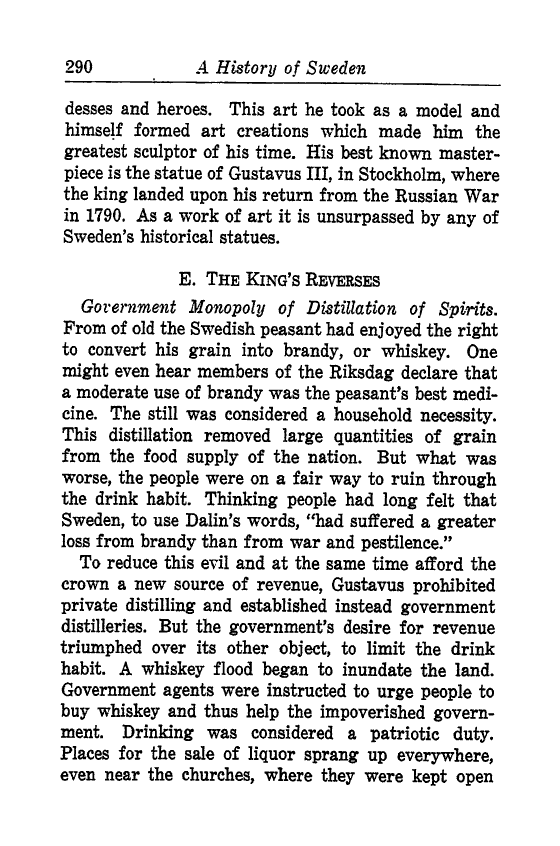
Full resolution (TIFF) - On this page / på denna sida - XVI. Reign of Gustavus III, 1771–1792 - D. Culture during the Period - E. The King’s Reverses

<< prev. page << föreg. sida << >> nästa sida >> next page >>
Below is the raw OCR text
from the above scanned image.
Do you see an error? Proofread the page now!
Här nedan syns maskintolkade texten från faksimilbilden ovan.
Ser du något fel? Korrekturläs sidan nu!
This page has never been proofread. / Denna sida har aldrig korrekturlästs.
290 A History of Sweden
desses and heroes. This art he took as a model and
himself formed art creations which made him the
greatest sculptor of his time. His best known master-
piece is the statue of Gustavus III, in Stockholm, where
the king landed upon his return from the Russian War
in 1790. As a work of art it is unsurpassed by any of
Sweden’s historical statues.
E. THE KING’S REVERSES
Government Monopoly of Distillation of Spirits.
From of old the Swedish peasant had enjoyed the right
to convert his grain into brandy, or whiskey. One
might even hear members of the Riksdag declare that
a moderate use of brandy was the peasant’s best medi-
cine. The still was considered a household necessity.
This distillation removed large quantities of grain
from the food supply of the nation. But what was
worse, the people were on a fair way to ruin through
the drink habit. Thinking people had long felt that
Sweden, to use Dalin’s words, "had suffered a greater
loss from brandy than from war and pestilence."
To reduce this evil and at the same time afford the
crown a new source of revenue, Gustavus prohibited
private distilling and established instead government
distilleries. But the government’s desire for revenue
triumphed over its other object, to limit the drink
habit. A whiskey flood began to inundate the land.
Government agents were instructed to urge people to
buy whiskey and thus help the impoverished govern-
ment. Drinking was considered a patriotic duty.
Places for the sale of liquor sprang up everywhere,
even near the churches, where they were kept open
<< prev. page << föreg. sida << >> nästa sida >> next page >>